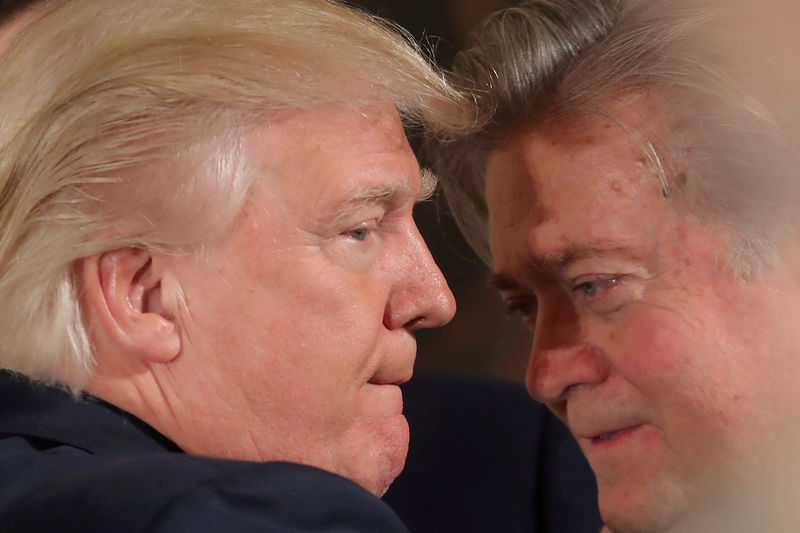By Jan Wolfe
(Reuters) - Any lawsuits by President Donald Trump against former chief strategist Steve Bannon or the author and publisher of a book depicting a chaotic White House and Trump as out of his depth would almost certainly fail and could lead to more damaging disclosures, legal experts said.
Trump threatened legal action against Bannon over "libelous" remarks quoted by writer Michael Wolff in the book "Fire and Fury: Inside the Trump White House," after excerpts were published by media outlets on Wednesday. Charles Harder, a lawyer for the president, told Reuters that he would take "legal action" to block the book's release. He sent cease-and-desist letters to Bannon, Wolff and publisher Henry Holt & Co.
Alan Dershowitz, an emeritus law professor at Harvard Law School, said a libel lawsuit by Trump would be a "terrible mistake" and "a nonstarter" that "no reasonable lawyer would recommend."
Dershowitz, who has often publicly defended the legality of the president's actions over the past year, said it is very difficult for public figures to prevail in libel suits. Trump would need to show Wolff and publisher Holt knew statements by Bannon and others were false or they acted with reckless disregard for whether or not they were true.
In the book, Bannon was quoted describing as "treasonous" and "unpatriotic" a June 2016 Trump Tower meeting Donald Trump Jr. and Trump son-in-law Jared Kushner held with a group of Russians who had promised damaging information about Democratic candidate Hillary Clinton.
Bannon has not responded to requests for comment.
Trump Jr. and Kushner have not commented on the quotes.
Elsewhere in the book, Wolff in his own voice describes Trump as "no more than semi-literate" in terms of his reading habits and being known among his social circle for having a "wide-ranging ignorance."
White House spokeswoman Sarah Sanders described the book as "some trash" filled with "mistake after mistake."
The publisher defended the book.
"We see 'Fire and Fury' as an extraordinary contribution to our national discourse, and are proceeding with the publication of the book," Holt said in a statement.
Holt on Thursday moved up the book's release to Jan. 5 from the original publication date of Jan. 9.
OPINIONS PROTECTED
Some lawyers said Bannon, Wolff and the publisher could all argue that many of the comments in the book were opinions, which are protected by the First Amendment and cannot be the basis of a libel action. Andrew Wright, a former associate counsel in the Obama White House and professor at Savannah Law School, said that would include Bannon's "treasonous" and "unpatriotic" quotes.
"I don’t think Bannon would have a hard time establishing that he meant it as an opinion that it was disloyal and improper rather than as a statement of law," said Wright.
In one letter to Bannon and another to both Wolff and Steve Rubin, President & Publisher, Henry Holt and Company, Harder also said Bannon violated non-disclosure and non-disparagement provisions of his employment agreement with the Trump 2016 election campaign by speaking with Wolff. He said Wolff and Holt could face claims of interfering with or inducing breach of that contract.
But legal experts said the employment agreement would not have applied to Bannon after he joined the White House staff. Because of transparency and free speech concerns, the government has far less power to limit non-classified speech by employees than private companies, said Bradley Moss, a Washington lawyer specializing in national security law.
Apart from facing long odds, a Trump libel lawsuit would also force the president to participate in an intrusive disclosure process.
Dershowitz said that defense lawyers would be able to subject Trump to "broad and far-ranging" depositions about "almost anything" and compel him to answer.
Moss said defense lawyers would also be entitled to interview White House officials and collect potentially damaging documents from them. "It would be one more distraction, one more thing people in the administration need to hire lawyers for."
Trump has a history of threatening lawsuits in his real estate business career and during his election campaign, though he has not always followed through. In the campaign, he threatened to sue the New York Times over its reporting that he made unwanted advances on two women.

Then-Republican candidate Trump was accused by 13 women who publicly said that in the past he had physically touched them inappropriately in some way. He said he would sue all of the women, calling them liars, but those lawsuits have not been filed.